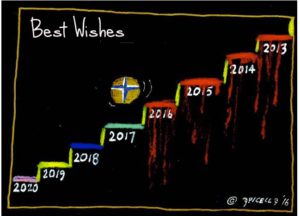 “When I consider everything that grows
“When I consider everything that grows
Holds in perfection but a little moment,
That this huge stage presenteth nought but shows
Whereon the stars in secret influence comment”. (SON 15)
Maybe I am in a minority, but I never understood or, rather, never assimilated the idea that that the end of the year should be a time for celebration. Unless the celebration is an exorcism to temporarily forget that the time we have lived through in the past year will never return again. Even the image of the ending year as a decrepit old man leaving us for eternity, to make space for a (temporarily) young new year, is depressing.
The most famous Italian poet of the XIX century, Giacomo Leopardi, also wrote a set of dialogs, written in the 1830s, one of which is titled “A Calendar Salesman.” Here is an extract.
Salesman. Calendars, new Calendars! Would you like to have one?
Passer by. Do you think that the new year will be a happy one?
Salesman. For sure, dear sir.
Passer by. As happy as the year past?
Salesman. More, much more.
Passer by. But then, which of the past years would you wish the next one to be like? Would you not like that?
Salesman. No, I would not like that at all.
Passer by. How long have you been selling calendars?
Salesman. About twenty years.
Passer by. To which among the past twenty years would you like the next one to resemble?
Salesman. I am not sure.
Passer by. But don’t you remember any in particular that you remember as happy?
Salesman. Not really.
Passer by. And yet life is beautiful. Would you not agree?
Salesman. Yes, for sure.
Passer by. Would you not like, then, to relive the past twenty years and the years before since the time you were born?
Salesman. My dear sir, would it please God that it were possible…
Passer by. Would you then like to relive the same life, with all the pleasures and pains it has given you?
Salesman. No, I wouldn’t like it.
Passer by. But then, what type of life would you like to have? My own life, or the life of the prince, or of whoever else? Don’t you think that I, the prince and whoever else would answer as you did? And that, if faced with the option to relive the same life (with no possible modification whatsoever), no one would like to turn back?
Salesman. I agree with that.
Passer by. But then what type of life would you wish for?
Salesman. A life as it comes without any pre-condition.
Passer by. You mean a life subject to chance, without any foreknowledge, just as we cannot predict how the new year will be?
Salesman. Yes.
Passer by. So would I, if re-living were an option, and so would everybody. However, this means that chance, until this year, treated everyone poorly. And it is clear that everyone thinks that, on balance, the bad prevailed over the good. For there can be no other reason why no one would like to relive exactly the same life. Which leads us to conclude that the good life is not the life we know, but the life that we know not. Not the past but the future life. With the new year, chance will begin to deal well with you and me, and everyone else, and we may start a happy life. Is it not so?
Salesman. Let’s hope so.
Passer by. All right. Show me the most beautiful calendar you have.
Salesman. Here it is, dear sir. It costs 30 “soldi”
Passer by. Here they are.
Salesman. Thank you, sir. See you again. Calendars, new Calendars!
The moral of the story is that the celebration of the new year is really the celebration of hope. For
“True hope is swift, and flies with swallow’s wings:
Kings it makes gods, and meaner creatures kings.” (1)
And though we can hope every day, the hope celebrated on New Year’s Eve accompanies the effort to sink, at least during a few moments or hours of merriment, the disappointments and the troubles of the ending year, “in the swallowing gulf of blind forgetfulness and dark oblivion.” (2)
More in general, we know that,
“The web of our life is of a mingled yarn, good and ill go together: our virtues would be proud, if our faults whipped them not, and our crimes would despair, if they were not cherished by our virtues.” (3)
It is the acceptance of the mingling of the yarn that, I think, makes life particularly challenging. For often, notwithstanding our best efforts, the results do not match expectations. And we are reminded that “Our wills and fates do so contrary run that our devices still are overthrown, our thoughts are ours, their ends none of our own.” (4)
or, even more pessimistically,
“As flies to wanton boys are we to the gods, they kill us for their sport” (5)
Still, 2016 was not exempt from surprises, some of which pleasant. Among them, we must certainly include the electoral defeat of a “woman whose sole name blisters my tongue.” (6)
Equally, it was defeat of the corporate media, previously used to attribute to the public an almost infinite flexibility of ignorance. Many believe that the event reflects a greater interest, throughout the public at large, in gathering information from alternative sources. If so the results of the election were not only a success, but a triumph.
In this context, I like to think that, in however minute a way, this blog may have helped some of its 25 readers to make up their mind.
For what is worth, I don’t expect that much will change on the political stage. Slogans such as “We will make America great again”, sound like the previous Obamanesque “Yes, we can.” At best they  are “… springes to catch woodcocks” (7). At worse, they are licenses to purchase by the blood (of others) the empty dignity of dominion and hegemony.
are “… springes to catch woodcocks” (7). At worse, they are licenses to purchase by the blood (of others) the empty dignity of dominion and hegemony.
A brief glance at the cities in ruin, in Syria, Libya, Yemen and elsewhere is sufficient to show, a posteriori, the ominousness of “yes we can.”
But forgetting these considerations, I wish all the readers and followers of the “Your Daily Shakespeare” website and blog a Happy and Prosperous 2017.
Opening Quote. Sonnet 15
** (1), (2) Richard III
** (3) All’s Well That Ends Well
** (4), (7) Hamlet
** (5) King Lear
** (6) Macbeth
Image Source. Artist Vincenzo Apicella
